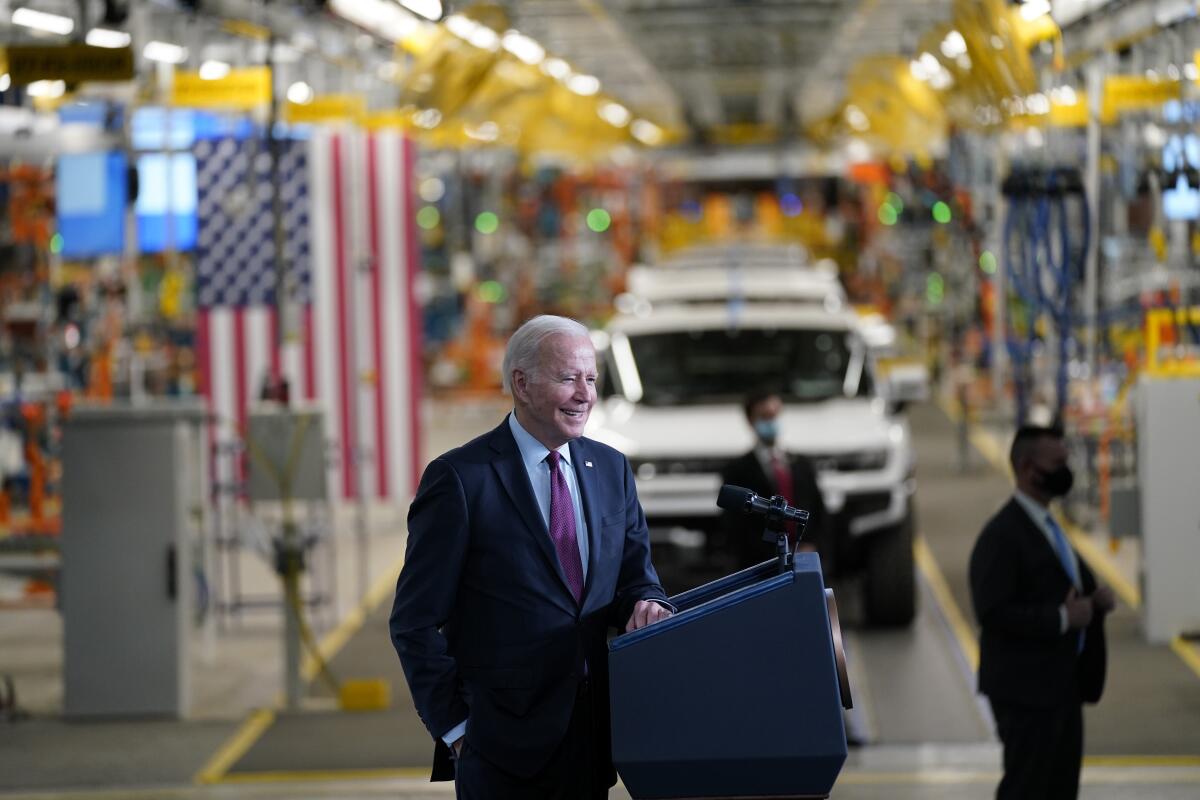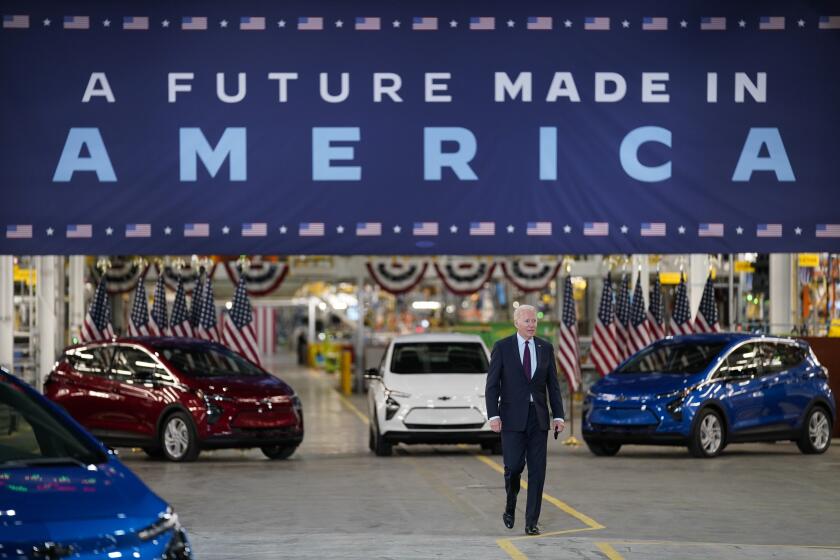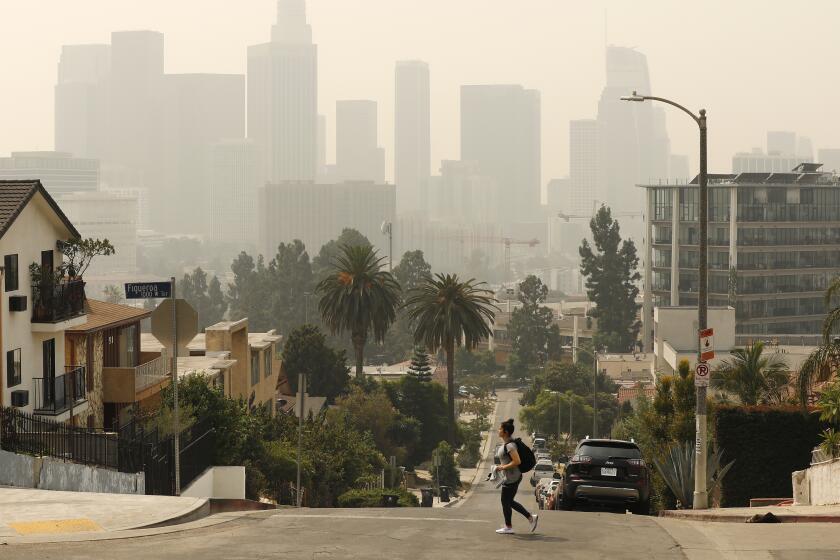Editorial: Biden doesn’t need to weaken EV rules to get reelected

- Share via
It’s profoundly disturbing that the Biden administration is planning to relax one of the biggest climate actions it has proposed — tough auto emissions standards designed to rapidly increase sales of electric vehicles — in an apparent election-year concession to automakers and organized labor. Transportation is the nation’s largest source of greenhouse gas emissions and these standards are among the most powerful tools the United States has to slash pollution fast enough to meet its climate change goals.
President Biden is mistaken if he thinks weakening environmental protections will help get him reelected. Advancing tough standards that position the country for a healthier and more globally competitive future should be considered an asset to his campaign, not a liability.
General Motors’ agreement to include autoworkers in battery manufacturing shows climate action to electrify the economy doesn’t have to mean abandoning workers.
The rules were proposed last year by the Environmental Protection Agency to ramp up sales of new zero-emission cars and light-duty trucks from about 7% of vehicles sold today to more than 67% by 2032. But multiple news outlets reported last week that the Biden administration may allow automakers to move more gradually toward that goal until after 2030 when it issues the final rules as soon as next month.
This would be an undeserved gift to auto manufacturers that have continually sought delays in environmental standards in order to keep selling as many highly profitable, gas-guzzling SUVs as possible, even while publicizing their own ambitious plans to transition to zero-emission vehicles. It may also be a concession to the powerful United Auto Workers union, which cited concerns about the transition to electric vehicles as one reason for withholding its endorsement of Biden until late last month. Organized labor is important to Biden’s reelection strategy in key swing states, including Michigan, where autoworkers worry that switching to electric vehicles will reduce the workforce or move jobs to nonunion plants with lower wages.
President Biden had the opportunity to fix the Trump administration’s decision to keep in place outdated health standards for smog. Instead the EPA is punting its decision about imposing tougher air quality limits until after the 2024 election.
But the administration should understand that supporting good-paying auto industry jobs and upholding high environmental standards are not mutually exclusive. Slowing down the nation’s adoption of electric vehicles moves in the wrong direction as the effects of climate change are accelerating. Earth had its hottest year on record in 2023 and weather has become more unpredictable and deadly.
The administration says it “is confident” the U.S. will achieve its goal of 50% zero-emission new car sales by 2030, and it seems to be arguing that the pace of the transition to electric vehicles is not as important as the end goal. But speed matters a lot when it comes to reducing air pollution and fighting climate change — especially after decades when world leaders did nothing.
Finally, the world agrees to move away from fossil fuels, adopting a historic agreement at the COP28 summit in Dubai. Doing it is another thing.
Each year that we delay phasing out fossil fuel vehicles is another year we’re failing the most vulnerable populations, including low-income people and communities of color hardest hit by the effects of air pollution, and future generations that will have to deal with the consequences of a warming planet. It’s also another year that the U.S. risks falling further behind competing economies, such as China, that are embracing electric cars and stand to dominate global transportation if we fail to keep up.
These decisions are not harmless. More than 100 million Americans live with air so polluted it can shorten their lives. Delayed pollution reductions mean children with developing lungs and people with asthma will have to wait years longer for air that doesn’t compromise their health, and all of us who will be saddled with a more dangerous climate from years of excess emissions.
Americans rely on the color-coded air quality index. But the EPA’s failure to update fine-particle limits means people are getting outdated information.
It’s not the first time the Biden administration has backed down from an environmental obligation for what appear to be political reasons. Last summer, for instance, EPA Administrator Michael S. Regan delayed action to strengthen the nation’s health standards for ozone — the lung-searing gas in smog — until after the 2024 presidential election.
Instead of slowing down the electric vehicle revolution and letting powerful industries and interests win a valuable delay, Biden should stand fast and focus on removing the barriers that are slowing EV adoption. Fixing the horrible state of the nation’s vehicle charging network or simplifying the confusing system of tax credits and rebates would make it easier and more affordable for Americans to give up their gas-guzzling cars.
Candidates make all kinds of deals and campaign promises to win support from powerful interests. But if Biden wants to win reelection in November, he needs to deliver results that don’t come at the expense of our health and climate.
More to Read
A cure for the common opinion
Get thought-provoking perspectives with our weekly newsletter.
You may occasionally receive promotional content from the Los Angeles Times.














